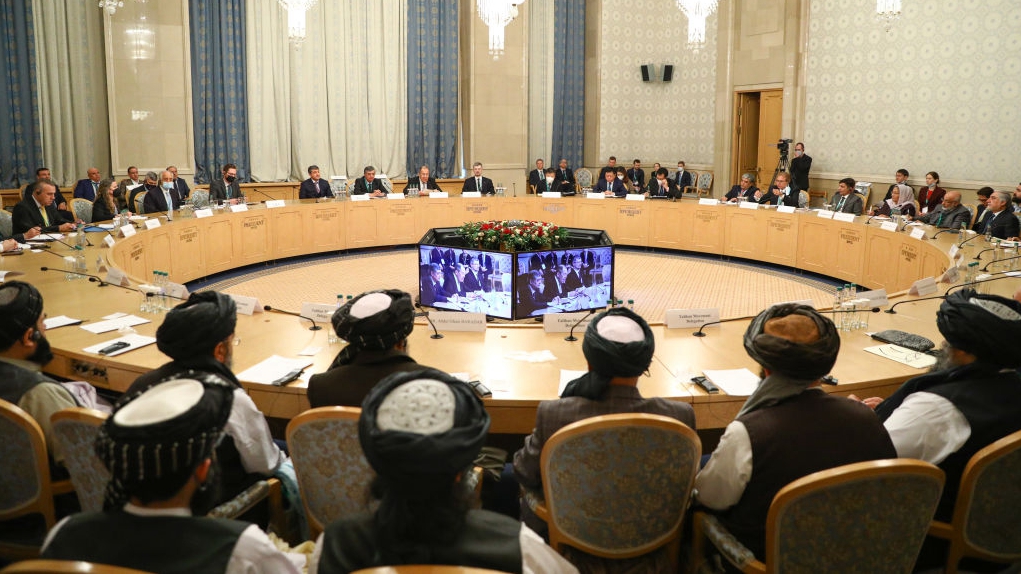
An international conference on Afghanistan is held in Moscow, Russia, March 18, 2021. /Getty
An international conference on Afghanistan is held in Moscow, Russia, March 18, 2021. /Getty
Editor's note: Andrew Korybko is a Moscow-based American political analyst. The article reflects the author's views and not necessarily those of CGTN.
Western leaders and their media outlets have fear-mongered about closer Chinese-Afghan ties since the Taliban's rapid takeover of that country earlier this month. They misportray such an outcome as being aggressively-intentioned on China's part and against their own interests there, which is a false assessment.
What few of those commentators acknowledge is that closer Chinese-Afghan ties are natural since these neighboring countries share the same mutually beneficial developmental interests that aren't aimed against anyone else, and even less have realized that their own governments' policies are accelerating this trend.
In particular, the U.S. recently froze the Afghan Central Bank's $9.5 billion assets around the same time as the IMF suspended the country's access to funds. This was followed up by the World Bank halting its aid to Afghanistan. The realistic recourse for its internationally unrecognized but de facto Taliban-led government is to rely on other sources of funding, which could lead to China playing a pivotal role in this respect.
Either way, it appears inevitable that Chinese-Afghan ties will become even closer than before and at an unexpected pace as well in light of the West's efforts to isolate the war-torn country's Taliban-led government through unilateral financial means. They wanted to punish the Taliban for seizing power but inexplicably expected that it wouldn't seek alternative sources of financing in response, particularly from China as seems bound to happen sooner than later. This makes the West's prediction about closer bilateral ties between those two a self-fulfilling prophecy to a certain extent despite their natural impetus as explained.
There are three important lessons to be learned from this observation. The first is that Western-controlled financial institutions are unreliable and arbitrarily discriminate against some of their partners for political reasons.
They also sometimes attach political strings to their assistance, which reduces the sovereign decision making of those who receive them. In this context, the West intends to punish the Taliban, but it's really just worsening the socio-economic suffering of average Afghans as always happens whenever it weaponizes these financial instruments for political reasons.

Taliban fighters patrol in the streets of a neighborhood in Kabul, Afghanistan, August 22, 2021. /CFP
Taliban fighters patrol in the streets of a neighborhood in Kabul, Afghanistan, August 22, 2021. /CFP
The second lesson is cliché and it's that every action of these sort provokes an equal and opposite reaction even if it's unintended or unexpected by those who initiate these dynamics. Although Afghanistan's de facto Taliban-led government has yet to officially request similar aid from alternative sources, it seems to only be a matter of time before they do since they don't have any other choice if they truly aspire to rebuild their country.
This means that the West is counterproductively accelerating the same process that it fearmongered about with respect to closer Chinese-Afghan ties, which to be clear, aren't at anyone else's expense.
Third, China doesn't attach any political strings to the aid that it or the institutions that it founded extend to their partners. That's actually one of the primary appeals of the country worldwide and the reason why so many countries want to cooperate with it.
They understandably want to retain their sovereignty in line with international law and justifiably feel uncomfortable sacrificing some of it to receive much-needed aid from Western countries and Western-led organizations. No matter how much the West denies that it weaponizes these instruments, the whole world knows that they're lying after they cut off financial support for Afghanistan.
Looking forward, Afghanistan's future remains bright in spite of the West's attempts to sabotage it through their weaponization of financial instruments against the Taliban, which will only worsen the living standards of average Afghans whether they intend to or not. China is a reliable partner for all since it doesn't attach political strings to its support for anyone.
There's no doubt that Chinese-Afghan relations will continue improving and that this will be mutually beneficial. What's most interesting about that though is that this trend will likely be accelerated by the West, but hopefully they'll realize that they have nothing to fear from such an outcome.
(If you want to contribute and have specific expertise, please contact us at opinions@cgtn.com.)

